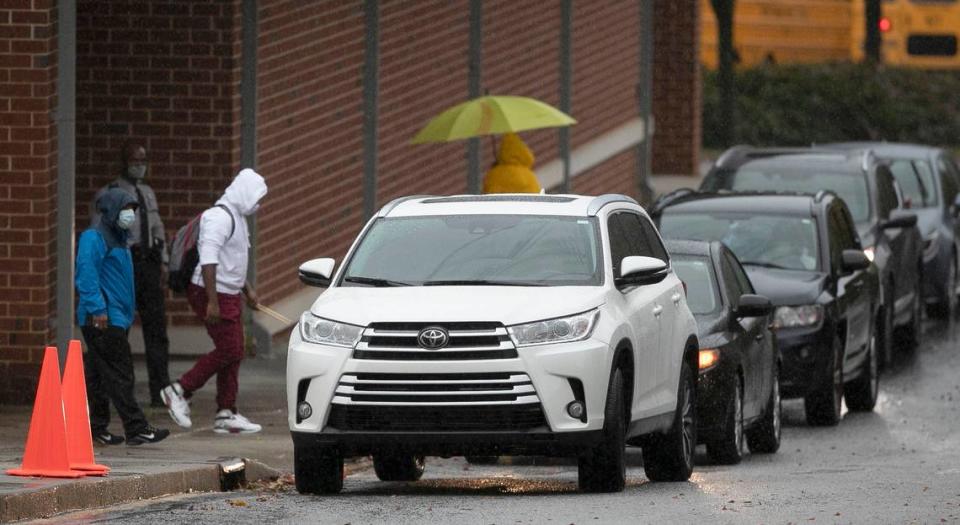Why NC schools shouldn’t be so quick to close for a day | Opinion
My kids were home from Wake County public schools on a lovely Thursday recently here in Cary where winds never exceeded about 15-20 mph (i.e., a gusty spring day) and rainfall was under an inch. It was Aug. 31 and school was canceled — the day after Hurricane Idalia made landfall in Florida as a Category 3 hurricane.
“Safety first” is a useful heuristic, but when tropical weather systems are involved, local governments and school systems have increasingly been canceling school, without appreciating the serious costs of these decisions to families, especially those in more precarious situations.
Durham Public Schools also closed Aug. 31, but Chapel Hill-Carrboro City Schools operated as usual.
I teach Public Policy at North Carolina State University and the recent decision by some school systems to close seems representative of an increasingly common trend of policymakers both over-estimating the benefits of canceling school and failing to adequately consider the costs. This trend is unfolding as climate change is causing an increasing number of school closings.
The benefits of a weather-related cancellation are, of course, avoiding any significant danger to students from being at school or traveling to school during poor weather. But how much danger is there, really, in a forecast for 15-20 mph winds and an inch or two of rain? Students go to school all the time in forecasts like that.
When there’s not really much danger, there’s not really much benefit to cancellation.
Meanwhile, when policymakers overreact and close schools for an essentially safe forecast, they are likely not fully considering the full range of costs to the families in their districts.
The costs — financial and otherwise — are very real for many families. Many parents have to scramble to find childcare. Some may even have to forego shifts at work and sacrifice needed income. Others may have no choice but to leave children home alone, which comes with another set of risks. Teachers may have to forego leave if they need to stay home with children who would otherwise be in school.
To be clear, if this was really serving to keep kids safe from a dangerous situation, it would be worth it. But for the accurately predicted, very modest impact of a tropical system centered over a hundred miles away, the costs to many, many families far exceed the very marginal, if any, safety benefits.

My teaching and research in public opinion helps explain why policymakers are likely substantially overestimating the danger when there’s tropical weather systems involved. When humans think about problems, they are often susceptible to priming effects, whereby exposure to one type of information may disproportionately affect how they think about related information.
In the case of severe weather, after hearing “hurricane” for days and calling to mind the images and experiences that go along with it, this almost surely affects our weather-related decisions, even if the hurricane or tropical storm is hundreds of miles away.
In 2020, using a national survey, I ran an experiment based on the Raleigh-area forecast for Hurricane Michael in 2018. In one version, survey respondents were asked about their likelihood to cancel schools in response to “heavy rain” and “25-35mph winds” due to “a strong low pressure system in the region” (i.e., a tropical system in words that do not prime all the negative associations). Other respondents were informed the same weather would be caused by “effects of Hurricane Michael in the region.” Those who were in the “hurricane” condition were much more likely to want to close schools for the exact same weather forecast.
In short, basic biases in human thinking likely cause policy makers to overestimate the impact of a safely distant hurricane or tropical system.
Yes, school systems should strive to keep kids safe, but there are very real costs to families that seem to be undervalued relative to, ultimately, low risk weather events. Sure, it’s just “one day” but when school systems cancel school at every minor chance of problems, the days add up and real learning loss can happen — something we are all more attuned to in the wake of the pandemic.
Regular cancellation of schools for only minimal threat from the weather also erodes confidence in local government and local school systems, a confidence that has already been shaken for many by the pandemic. Of course, keep our kids safe, but North Carolina school policymakers need to more fully consider the costs of their weather-related decisions.
Steven Greene is professor of Political Science in the School of Public and International Affairs at N.C. State University.
